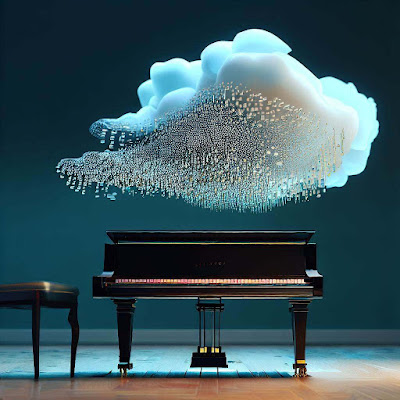Composing Music with ChatGPT: An Inspiration or a Threat to the Musicians?

The Evolution of Music Composition
The landscape of music composition, once predominantly traditional and manual, is currently undergoing a transformative process through the intervention of state-of-the-art technology. Along with the torchbearer in this evolutionary transition — the Google’s MusicML, there is none other than OpenAI’s artificial intelligence (AI) model, ChatGPT.
ChatGPT has transcended its initial mandate of generating human-like text to now dabble in the domain of harmonious and unique music creation. This intriguing transmutation brings to the forefront a complex blend of opportunities and challenges, fuelling the discussion around AIs controversial role in the artistic world.
The AI-based Maestro New and inspiring service to create short music compositions was built with underlying ChatGPT tech and it stands as a testament to the capability of AI in music composition. With a prompt from the user serving as its muse, this service can procure a MIDI tune that can be played in any web browser. The MIDI file can be downloaded and used later. This intriguing fusion is a harbinger of innovation and unexplored creative avenues. Here is an example of what GPTchatly service could do: https://www.youtube.com/shorts/O-UHOI63JlY ChatGPT: Redefining Music CompositionEmbracing ChatGPT for music composition unfolds a myriad of benefits, particularly when juxtaposed against conventional composition methods.
ChatGPT’s ability to generate music bears a cornucopia of advantages:
Music Composition for All: ChatGPT effectively dismantles technical barriers, making melody creation accessible to all, regardless of their musical proficiency. Infinite Creativity: The AI’s capacity for creating distinctive compositions essentially pushes the boundaries of traditional music. Swift Composition: With efficiency at its core, the AI model can rapidly churn out music pieces. This feature is especially beneficial for generating background scores or advertising jingles, where time is of the essence.
A Juxtaposition with Traditional Music Composition
The traditional route of music composition, often marred by laborious procedures and painstaking manual interventions, contrasts sharply with the speed and convenience offered by ChatGPT. The AI model serves as an endless source of inspiration, fuelling the creative engine of musicians with novel possibilities.
A Reality Check
Although advantageous, AI-composed music through ChatGPT is not devoid of constraints and potential challenges.
Constraints of AI-Composed MusicThe musical rendition of AI, including ChatGPT, may encounter several hurdles: Emotional Disconnect: While AI can mimic patterns suggesting various moods in music, it lacks the profound understanding and emotional subtlety a human composer imparts to the composition. Reliance on Prompts: The music produced by ChatGPT is directly influenced by the quality and specificity of the user’s prompts. However, crafting effective prompts often necessitates a foundational understanding of music theory. Unpredictability of Outputs: There may be instances where the generated music strays from the user’s preferences or expectations, adding an element of unpredictability to the process.
The Road Ahead
These challenges notwithstanding, ongoing research and iterative improvements promise an ever-improving future for AI-generated music. Strategies such as developing more intuitive user interfaces for prompt provision, or employing reinforcement learning to better train the AI to generate music infused with emotional depth, could enhance the overall music creation process.
As we navigate the fascinating intersection of technology and art, it’s essential to perceive the capabilities of ChatGPT as a muse for inspiration, rather than a rival to musicians. This AI model, despite its constraints, stimulates and enriches creative thought, heralding a new era in the world of music composition. With its potential to enhance and democratize music creation, ChatGPT is not a threat but a transformative tool that musicians can wield to push the boundaries of their creativity.
The key, as always, is to harmonize this newfound technological prowess with the enduring power of human imagination. In this synergy lies the future of music — a future where AI and musicians perform a duet, crafting melodies that reflect the best of both worlds. As we move forward, it’s exciting to envision the unique compositions that will arise from this interplay of human creativity and AI sophistication.
Indeed, while ChatGPT is an impressive conductor, it is the human hand that writes the prompts and infuses life and emotional depth into the music. Together, this unique partnership between man and machine could orchestrate a symphony of innovation, sparking a musical revolution that echoes through the ages.
Earlier posts:
Foreign Language Learning Contemporary Instruments and the Promises of ChatGPT
Learn Finnish Language with ChatGPT (LearnFinnish.AI)
Free no-code no registration web app for combining scatterplots with barplots
Comment